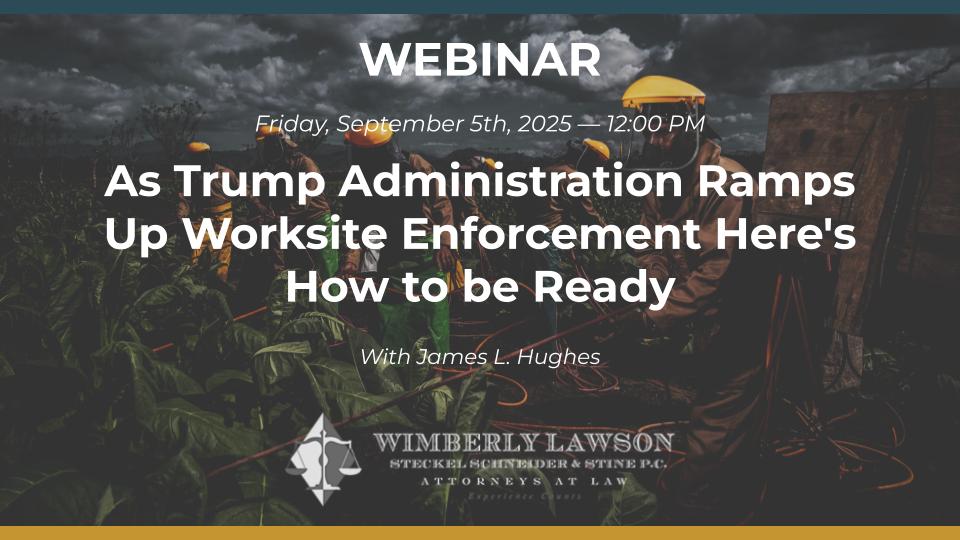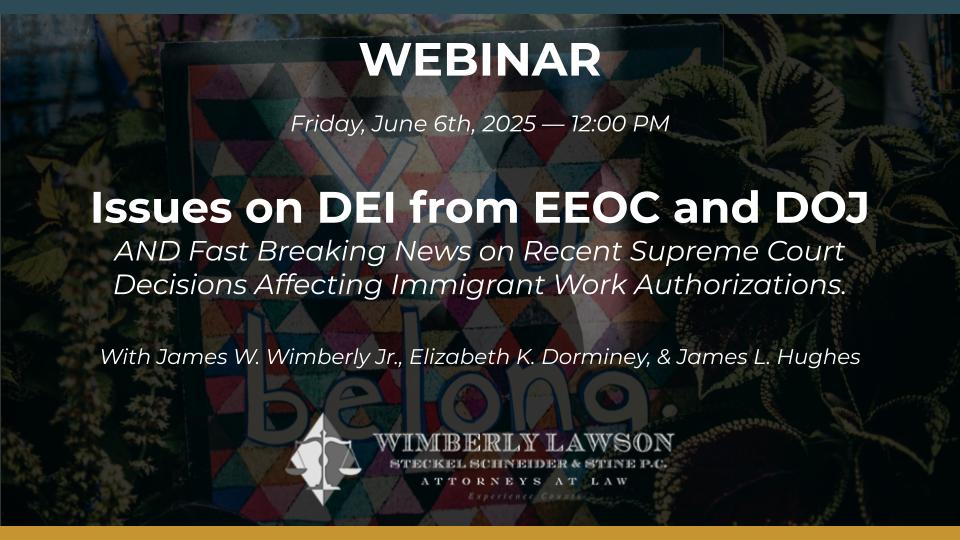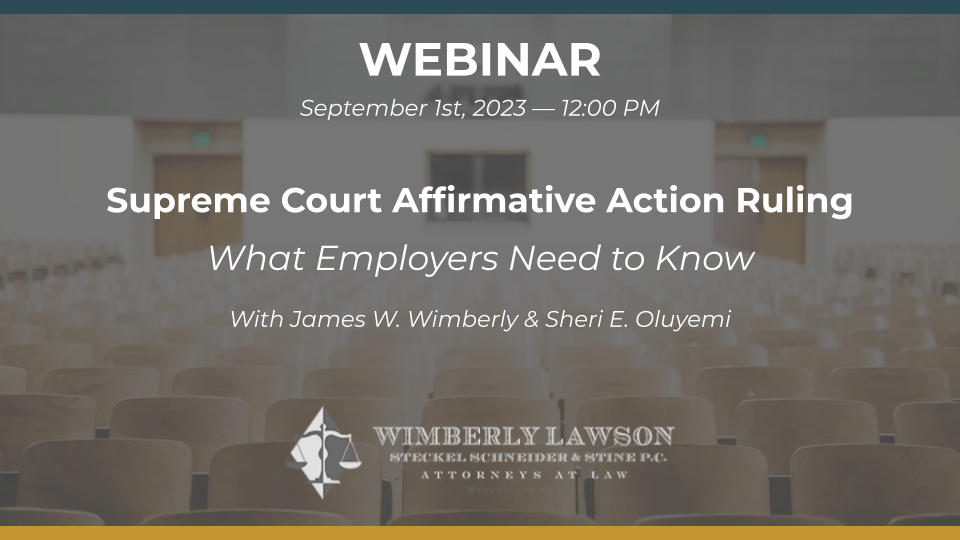
As the Trump Administration Ramps Up Worksite Enforcement, Here's How to Be Ready
In April 2025, ICE issued a notice of intent to fine three Denver, Colorado businesses over $8 million following worksite audits that uncovered widespread employment eligibility violations. ICE already has detained more than 1,000 workers through worksite enforcement actions this year. Are you ready for a worksite audit or worksite raid? In this on-demand webinar, we help you prepare.
Watch This Webinar
Webinar Key Insights
Based on Jim's presentation, here are the key insights and takeaways you should focus on regarding worksite enforcement and compliance:
- Increased Worksite Enforcement: The current administration is increasing its emphasis on worksite enforcement, which means employers should expect a sharp increase in raids, more aggressive tactics, and a focus on industries such as employee staffing, restaurants, manufacturing, and meat processing.
- High Financial Stakes: Non-compliance carries severe penalties, including potential fines of over $8 million, criminal sanctions for criminal conduct, and fines of over $5,000 per unauthorized worker. Simple I-9 paperwork violations alone can result in fines over $2,800 per form.
- Audit Readiness: Employers must be prepared for ICE Notices of Inspection (NOIs), which require you to present I-9s, payroll, and other documents within three business days.
- I-9 and E-Verify Accuracy is Critical: Rigorously ensure that all Form I-9 documents are properly completed, that hire dates match payroll and E-Verify records, and that documents submitted to E-Verify precisely match the options selected on the form. Errors here are a primary target for fines.
- Action on Status Changes: Utilize E-Verify Status Change Reports to identify employees who have lost work authorization (e.g., due to termination of TPS or parole status) and promptly take necessary action to ensure compliance.
- Raid Response Plan is Essential: Develop and practice a plan (similar to a fire drill) for how your company will respond to a surprise raid to minimize disruption, spoilage, and potential liability.
- Know Your Rights on Entry: Law enforcement agents (including ICE) can enter public areas of your business without a warrant. However, they need a judicial warrant signed by a judge (not just an administrative subpoena from DHS) or your consent to enter private, non-public areas.
- Limit Statements and Cooperate Politely: Do not block or interfere with the search, but also train your company representatives not to give statements or allow themselves to be interrogated without first consulting an attorney. You should also request a copy of the warrant and document everything the agents do and seize.
- Do Not Obstruct Justice: You cannot direct employees to refuse to speak to agents, nor can you hide or assist employees in leaving the premises, as this could lead to obstruction of justice charges.
FAQ
What recent high-profile actions did ICE take regarding worksite enforcement?
In April, ICE issued a notice of intent to fine three Denver, Colorado businesses over $8 million following worksite audits. In June, ICE, Border Patrol, the Louisiana State Police, the ATF, and the FBI arrested 84 illegal aliens at the Delta Downs Racetrack in Louisiana. [00:37, 01:17]
How many workers has ICE detained so far this year through worksite enforcement?
So far this year, ICE has detained more than 1,000 workers through worksite enforcement actions. [02:00]
What law made it illegal to knowingly hire or retain unauthorized workers and required the Form I-9 process?
The Immigration Reform and Control Act of 1986. [02:26, 02:35]
How did enforcement intensity change during the Trump administration?
There were increased worksite raids and arrests with a sevenfold increase in ICE arrests at worksites in 2018. [02:59]
Which industries are worksite raids tending to focus on?
They are focusing on employee staffing agencies, restaurants, manufacturing, grocery stores, meat processing, and probably a few other industries. [04:19]
What are ICE and Homeland Security now serving to employers to request documents?
They are serving thousands of Notices of Inspection, which are requests for documents like I-9s and payroll records. [05:27]
How quickly must an employer present records after receiving a Notice of Inspection?
You have to be ready to present those records within three business days of the demand. [05:54]
What is a Notice of Suspect Documents?
It is a notice issued after review of records that identifies employees who do not appear to have proper work authorization. [06:14]
What is the typical fine for I-9 paperwork violations?
The fine is usually over $2,800 per I-9. [07:08]
How do ICE 287(g) agreements relate to local police?
The 287(g) agreements allow local police to help enforce immigration laws, with over 579 such agreements nationwide. [07:44, 08:00]
How can employers prepare for an ICE audit of their records?
Employers should ensure they have a properly completed Form I-9 for each employee, that the hire date on the I-9 matches payroll and E-Verify records, and that documents recorded on the I-9 match documents submitted to E-Verify. [09:47, 10:11]
What are Status Change Reports in the E-Verify system?
These reports notify employers of people who have lost employment authorization, for example, due to termination of parole status or TPS status. [11:51]
What is required for law enforcement to enter non-public areas of a workplace during a raid?
They must have a valid search warrant or the employer's consent. [13:00]
What must a judicial search warrant include?
It must be signed and dated by a judge, include a timeframe for the search, a description of the premises, and a list of items to be searched for. [13:21]
What does it mean for a company to accept the warrant but not consent to the search?
You do not have a choice when they enter with a judicial warrant, but you can state that you do not consent to the search, which allows you to later challenge the search if there are grounds to do so. [14:02]
Can law enforcement use an administrative subpoena to enter private areas of a business without permission?
No, an administrative warrant or subpoena does not allow agents to enter private areas without your permission. [15:52]
What should an employer look for to confirm a document is a judicial warrant?
A judicial warrant must be signed by a judge and say "US District court" or have a state court identification at the top. [18:22]
Should company representatives give statements to federal agents?
Company representatives should not give any statements to federal agents or allow themselves to be interrogated before consulting with an attorney. [22:48]
Can an employer direct employees to refuse to speak to federal agents?
No, you may inform employees that they may choose whether or not to talk with federal agents, but do not direct them to refuse to speak to agents. [23:13]
Should an employer hide employees or assist them in leaving the premises during a raid?
No, you should not hide employees or assist them in leaving the premises without permission to do so, as it could result in an obstruction of justice charge. [24:30]
Webinar Transcript
James L. Hughes (00:00):
<Silence> Good afternoon. My name is Jim Hughes and I am with the firm of Wimberley and Lawson. Today I will try to inform you about recent actions taken by the Trump administration to promote work site enforcement of the immigration laws, and I will also give you some ideas about how to be ready for any enforcement action. So, let's get started. I want to start off by mentioning a couple of fairly high profile actions that occurred this year. One was in April when ICE issued a notice of intent to find three Denver Colorado businesses, over $8 million following work site audits that uncovered widespread employment eligibility violations. Now, these audits would've been basically I nine type paper audits where the government went in, asked for the I nines payroll records and other records, and then returned with a notice of intent to find.
James L. Hughes (01:14):
Now you can receive a notice of intent to find if you have paperwork violations. You can also receive a notice of intent to find if you have people who appear to be unauthorized to work in the United States. In June ice Border Patrol, the Louisiana State Police the A TF and the FBI arrested 84 illegal aliens during a work site enforcement operation at the Delta Downs Racetrack in Louisiana. And so far this year, the ICE has already detained more than 1000 workers through work site enforcement actions this year. Now, that may not sound like a lot, but it does indicate that the Trump administration is placing more emphasis on work site enforcement, and it's something that employers need to be aware of. Now, as most of you already know, the immigration and Reform, the Immigration Reform and Control Act of 1986 made it illegal for employers to normally knowingly hire or retain unauthorized workers.
James L. Hughes (02:35):
It also required employers to go through a verification process called Form I nine to verify the employment eligibility of the workers. Now, as you may recall, enforcement intensity has changed with each administration. During the Trump administration, there were increased work site raids and arrest with a sevenfold increase in ice arrest at work sites in 2018. During the Biden administration, there were not as many mass raids, and they were focused more on national security interest and targeted enforcement. But we're now back under the second Trump administration. And as you are aware, they are certainly targeting criminal illegal aliens, but they are also ramping up work site enforcement, and they are emphasizing the arrest of illegal workers and insisting on employer compliance. Now, this back and forth reflects the different attitudes that people in government have about enforcing federal immigration laws. So that debate will likely continue for several more years.
James L. Hughes (03:59):
Here's some key information. One is you can expect that the raids have sharply increased during the Trump administration. The enforcement tactics will also become more aggressive. There will be surprise raids. In fact I heard yesterday about a raid here in Georgia, and there are concerns from employers in the area that they will be rated. Also the raids tend to focus on certain types of industries. They are focusing on employee staffing agencies, restaurants, manufacturing, grocery stores, meat processing and probably a few other industries. Now, if illegal workers are found, they are often immediately detained, and to the extent they can get away with it, they're deported to the home country or an alternative country. Now, some people complain that labor rights and due process concerns are growing. Certainly there's been a lot of litigation over the rights of TPS workers and workers who had parole status.
James L. Hughes (05:16):
The federal government is tending to win those cases when it, when those cases reach the Court of Appeals or the Supreme Court. So we are really expecting TPS workers to decrease, and certainly people who were here under the CHMD parole programs are generally not allowed to work any longer. Let's go into the specifics. ICE and Homeland Security are now serving thousands of notices of inspection. And those notices of inspection are basically requests for your documents so that they can look at the I nines, the verify records, your payroll records to determine whether you have any illegal workers. You have to be ready to present those records within three business days of the demand. After the government reviews those records, they are now issuing notices of suspect documents, and that's a notice that identifies employees who do not appear to have proper work authorization.
James L. Hughes (06:39):
Now, you as an employer will have to contact those employees and make inquiry about whether they have other proof of work authorization. If you continue to employ these people and they cannot produce other proof of work authorization, then you may be face bonds of more than $5,000 per illegal worker. In addition if you are considered to be engaged in criminal conduct, there can be criminal sanctions in addition to fines for the unauthorized employment of workers. You may face I nine paperwork violations, and usually that's a fine right now of over $2,800 per I nine if there happens to be a raid. They could be de depending detaining employees at your work sites during the audits, if you have federal contracts you may be subject to debarment. There's also been an increase in local government cooperation. This year, ICE has announced the signing of more than 444 new, 2 87 G agreements, which allow local police to help enforce immigration laws.
James L. Hughes (08:09):
So now there are more than 579 such agreements nationwide. And more of these agreements are being entered into each month. How, looking ahead, we expect ICE to expand work site enforcement in 2025. As funding and political support and law enforcement support is available. They will make greater use of technology for I nine audits in an effort to spot paperwork errors and unauthorized workers more quickly. Local law enforcement will also be helpful in some jurisdictions. There are pending legislative proposals to increase employer accountability de such as higher fines or repeat offenders. And my personal opinion is that the government should do a better job of keeping illegal workers out of the United States rather than forcing employers to pay penalties. But that's the way the government operates. And of course, we'll continue to have debates about labor rights and the need for immigration reform.
James L. Hughes (09:33):
There are certainly some people who advocate that we need more workers whether they're legal or illegal. And then you have the other side saying that we should only allow a legal workforce in the United States. So recognizing that there will be increased work site enforcement, how do you get ready? Well, there are two situations that you need to prepare for. The first one is simply an ice audit of your records. You should make sure that you have an I nine for each employee. You should make sure that the I nine is properly completed. You should make sure that the hire date on the I nine matches the payroll records and the hire date on the E-Verify record. Now, if there's a problem usually you cannot correct the E-Verify record once you have completed your E-Verify process. So try to do it correctly on the front end.
James L. Hughes (10:47):
The documents that are recorded on the I nine need to match the documents submitted to E-Verify. For example, you may have a Department of Driver Safety issued ID or driver's license. When you go to E-Verify, if that's the, if the employee gave you a Department of Driver Services issued ID or driver's license, then you should select that box and E-Verify. You should not select the federal, state, or local agency ID when the document given to you is A DDS issued id. A lot of employers are making the mistake of selecting the second option and you verify of federal or state or local agency id, and that I anticipate will become more of a problem as these work site enforcement measures increase. Also several months ago, the Department of Homeland Security started issuing status change reports through the E-Verify system. The status change reports notify you of people who have lost employment authorization, either because of termination of their parole status or termination of their TPS status or possibly some other situations.
James L. Hughes (12:25):
So you need to make sure that you have dealt with each employee who has identified in a status change report in accordance with applicable law. Now, if it, if the decision is that they are no longer authorized to be employed, you should terminate their employment. If they have provided evidence of other employment authorization that you've been able to verify, then they can continue in employment. So be prepared to provide the I nines the payroll records and other requested documents within three business days. Now, let's talk about how to prepare for a surprise ice raid. You rarely get advanced warning of an ice raid. Let me give you a brief overview. Law enforcement officers are permitted to enter public areas of your workplace, but they must have a valid search warrant or your consent to enter non-public errors. A ve warrant must be signed and dated by a judge.
James L. Hughes (13:33):
It will include a timeframe within which the search must be conducted, a description of the premises to be see searched, and a list of items to be searched for, and c for example, payroll records, employee identification documents, I nines, social security con correspondence, et cetera. Now, typically when an agent enters your premises, they will serve the search warrant on a receptionist or a company representative and alert other agents to enter. Your company can accept the warrant, but not consent to the search. And let me explain that you really don't have a choice when they enter with a warrant, but you can state that you do not consent to the church search. If you do not consent to the search, the search will proceed, but you can later challenge the search if there are grounds to do so. Depending on the type of business, law enforcement may demand that equipment be shut down and that no one leave the premises without permission.
James L. Hughes (14:48):
It also may be in the interest of the, the employer to seek permission to shut down the equipment, particularly in food processing industries, so that you can minimize the amount of spoilage that may occur. You should recognize that law enforcement will move employees into a contained area for questioning, and there may be some agents who question employees while others execute the search and seizure of items listed in the warrant. So, to repeat public areas, anyone including ICE agents can enter public areas of your business without permission. Public areas may include the dining area in a restaurant, the parking lot, the lobby, or a waiting area. For the private areas, they have to show they have a warrant. No one can enter a private area of your business without your permission or a judicial warrant. Sometimes law enforcement will try to use an administrative subpoena to enter, but an administrative warrant or subpoena does not allow agents to enter private areas without your permission.
James L. Hughes (16:06):
These administrative warrants or subpoenas are not from the court. They'll typically say Department of Homeland Security and are on federal government forms. Now, it would be helpful if you have private areas in your business to mark them as private or as employee only. And it's also helpful if you can keep the doors closed or locked or otherwise limit public access to your private areas. Now let me show you what a warrant might look like and also what a subpoena might look like. On the left side, you see a judicial warrant. It in this example, it was issued by United States District Report, and you'll see that the court is identifiable. It identifies the name the warrant is issued to. It clearly states that it's a search warrant. You need to check if the date is current. So, for example, as you can see, the warrant allows the government to come in on or before February 17th, 2022. If the federal government were to come in on February 19th, 2022, that warrant's no good, and you can say your warrant's no good. Also the warrant must be signed by a judge. Now, if you look to the right, you'll see that that document is
James L. Hughes (17:49):
A document from the Department of Homeland Security. You can check to see if the name is correct. It may be signed by an ICE agent or a DS DHS agent. But that is not a warrant that would permit them to enter your PRIs premises. Without your permission, you could only, they could only enter your premises with your permission. So to repeat, immigration agents can enter a private area only if they have a judicial warrant from a court or your permission. A judicial warrant must be signed by a judge and say, US District court, or have a state court identification at the top without a judicial warrant, ice agents need your permission to enter private areas of your business. If agents try to enter a private area, you should say this is a private area. You cannot enter without a judicial warrant signed by a judge.
James L. Hughes (18:59):
Do you have a judicial warrant? In most ICE raids situations, they will have a judicial warrant. You can ask the agent for a copy of the warrant and you can read it. You wanna make sure that it is a warrant signed by a court and that it is served within the permitted timeframe. And you need to understand the search and the scope of the warrant in the items to be seized. For example, it's not uncommon for the government to want to take not only paper files, but also computer hard drops. Now, some of those items may be crucial to continuing to operate your business, and you may be able to politely request that you keep copies of those records. You might also prepare in advance to have copies at another remote site, for example, storing any records you need in the cloud so that they can be retrieved pretty quickly.
James L. Hughes (20:08):
Also, you should contact your attorney promptly and send a copy of the warrant to your attorney. It would be helpful if you could write down the name of the supervising agent, and if you can learn it, the name of the US attorney assigned to the, to the case. Try to have at least one company representative follow the agents around your facility to take notes and videotape the officer. Note that any item seized can be made that ask if copies can be made before they were taken. If they don't allow you to make copies sometimes they will provide copies later. If agents want to enter a locked part of your premises, you should all unlock that door or area in your plant so that they can enter it. You can still indicate that you're not consenting to the search, but you need to cooperate with the search.
James L. Hughes (21:20):
You can request reasonable accommodations. For example, you know, shutting down equipment you, you may insist on retaining a copy of documents and other materials that are central to your business. Reasonable requests are usually granted, but I would encourage you to always be polite in your interactions with the agents, do not block or interfere with their activities. You can object to a search outside the scope of the warrant, but do not engage in debate or argument with the agent about the scope of the warrant. Simply state your objection to the agent and make a note of it. Now, sometimes as they are gathering documents and files, they will collect privileged material. If you're aware that they are collecting privileged materials, then you should ask that the documents not be inspected by agents until you are able to speak to your attorney.
James L. Hughes (22:40):
If they insist on seizing the documents, you cannot prevent them from doing so. Just try to make a record of what documents were taken and ask the agents for a list of what they took. They are supposed to provide you with the list of everything that they've taken, the number of computer hard drives, the documents that they've taken, et cetera. Now company representatives should not give any statements to federal agents or allow themselves to be interrogated. Before consulting with an attorney, you may inform employees that they may choose whether or not to talk with federal agents, but do not direct them to refuse to speak to agents. When question, let me give you an example. There will be in some workforces, people who are legal to work in the United States, but who are afraid of any sort of law enforcement activity. Sometimes law enforcement can talk with these workers and determine whether they are legal to work in the United States.
James L. Hughes (23:59):
You do not want to get involved in that because I would not want you to be facing an obstruction of justice charge. Just let the employees react as they think appropriate. Some of them will choose not to talk, and that's their right. Some will be happy to talk and show that they have a permanent resident card or an employment authorization document so that they're not taken off to jail. I want to emphasize that you should not hide employees or assist them in leaving the premises without permission to do so. Could also result in an obstruction of justice charge. Always tell the truth. If employees that they're looking for are present, tell the truth. Do not try to shred or obscure document. It's also worthwhile to remember the health and welfare of your employees. Sometimes these enforcement actions can last around and it it is not uncommon that they do.
James L. Hughes (25:11):
Sometimes employees may require medication or medical attention, or they may have children who need to be picked up from school. These concerns should be communicated to the law enforcement officers and they will make the accommodations that they think appropriate under the circumstance. Now, as an employer, it, we've talked primarily about your legal rights and obligations, but you also need to have a plan for your business. And that's outside of what I can do in this presentation. But it's worthwhile for you to talk to other businesses or business associations and ask what they're doing to prepare, make a plan that works for you. I'll just take the example of a poultry company, and this would probably be true of any meat processing facility. You have birds coming in from the farms to a first processing operation. If the government comes in, they will not allow any trucks or people to enter the premises or to leave the premises during the time that the work site enforcement action is underway.
James L. Hughes (26:36):
So you, you may have to return the birds to the farm for pickup at a later time. You may have shipments that are ready to go out to customers that need to be returned to the chiller because they cannot be delivered as scheduled. You may have product on the line and you need to have a plan for how you minimize spoilage and that sort of thing. In the event of a raid, it's worthwhile to practice. Now, I I don't want to encourage employees to, to leave your facility, but it, it could be something similar to a fire drill. And you, you may want to train your employees like it's a fire drill so that they can shut down operations and a move in an orderly manner like there would in a fire drill. Now that concludes the portion of my presentation. Alright, well, I thank you for attending today and if you do have any questions just contact me at Wimberley and Lawson in Atlanta, Georgia. You can call at the number on the screen or send me an email if you have my email address and enjoy the rest of your week. Thanks for attending.




